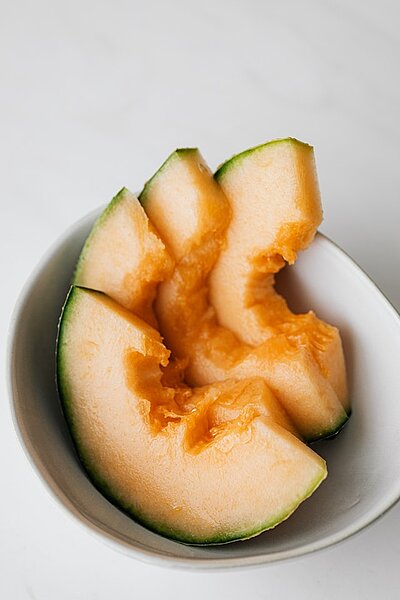Sugar melon

Candy melon is a sweet and juicy fruit that is particularly popular in summer. But can you share it with your dog? In this article, you'll find out what muskmelon is, what benefits and disadvantages it has for dogs and how to feed it properly.
What is muskmelon?
Sugar melon, also known as honeydew melon or cantaloupe, is a round fruit with a yellow-orange skin and orange-colored flesh. It belongs to the gourd family and originally comes from Africa. Sugar melon is rich in vitamins A, C, B6 and potassium and has a high water content.
What are the benefits of muskmelon for dogs?
Sugared melon can be a tasty and healthy supplement for dogs if you feed it in moderation. The fruit can help your dog stay refreshed and hydrated, especially on hot days. In addition, muskmelon can boost the immune system, improve eyesight and aid digestion. In addition, muskmelon is low in calories and fat, which is good for your dog's figure.
What are the disadvantages of muskmelon for dogs?
However, too much muskmelon can also have negative consequences. The fruit contains a lot of sugar, which can lead to obesity, diabetes or tooth decay. In addition, muskmelon can cause diarrhea or flatulence if your dog is sensitive to it. Therefore, you should only give your dog small amounts and pay attention to how he tolerates it.
How do you feed muskmelon correctly?
If you want to give your dog muskmelon, there are a few things you should bear in mind:
- Remove the rind and seeds from the fruit. The rind can contain bacteria that can lead to gastrointestinal infections. The seeds can cause an intestinal blockage or be poisonous.
- Cut the fruit into small pieces or puree it. This way you can prevent your dog from choking or gagging.
- Only give your dog a small amount as a snack or reward. A rule of thumb is that fruit should not make up more than 10% of your dog's daily calorie intake.
- Do not mix the fruit with other foods or feed it immediately after eating. This can lead to digestive problems.
- Observe your dog after feeding and look out for signs of intolerance or allergy. These include vomiting, diarrhea, itching or shortness of breath. If you notice these, you should consult a vet immediately.
Candy melon can be a tasty and healthy treat for dogs if you feed it correctly. The fruit can bring your dog many benefits, but it can also have some disadvantages. Therefore, you should always be careful and keep a close eye on your dog.
If you notice any signs of hypersensitivity or poisoning in your dog, you should see your vet immediately. We are not a substitute for a vet, but we try to be as accurate as possible. Every dog reacts differently and we recommend you get a second opinion or consult your vet if in doubt.
Stay healthy and take good care of your four-legged friend!😊